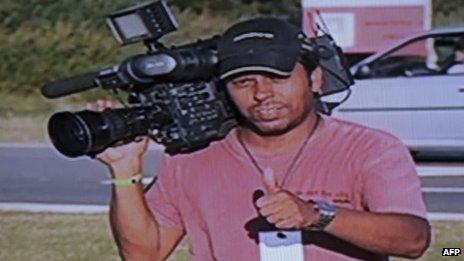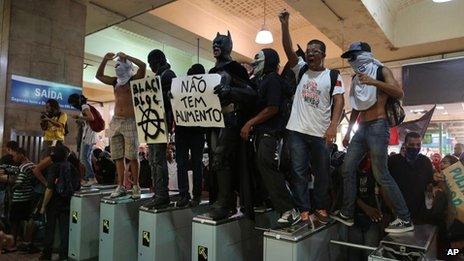Two charged over Rio cameraman Santiago Andrade's death
- Published

Santiago Andrade was in coma for several days before he died
Prosecutors in Brazil have charged two activists with murdering a cameraman during a protest in Rio de Janeiro.
Band TV cameraman Santiago Andrade, 49, was hit in the head by a flare last Thursday while covering a protest against public-transport fare rises.
Caio Silva de Souza is accused of throwing a flare handed to him by Fabio Raposo. They have both been charged with murder.
Mr Andrade's death has polarised the debate over the street protests.
The two suspects, both aged 22, were detained earlier this week.
Mr Raposo handed himself in after footage and photos that showed him holding the flare were shown on TV and social media.
He agreed to co-operate with the police and provide a description of the man he said had set the flare alight.
"I was the man who appeared in the photos in the media," Mr Raposo told police.
"I was handing over the item to another person, but it wasn't mine, I want to make it very clear."
Mr Souza was detained on Wednesday at a hostel in Feira de Santana, some 1,500km (950 miles) north of Rio.
Police say he admitted to lighting the flare outside Rio's Central station, but he denied intending to hurt anyone.
But Mr Souza's lawyer, Jonas Tadeu Nunes, claims that his client was "bullied into confessing".
He said Mr Souza should be released immediately and the whole inquiry scrapped.
Tear gas and stones
The demonstration began peacefully, with hundreds of people protesting against an announced 9% rise in bus fares.
Clashes began when the protesters entered the Central station in the afternoon rush hour.
Ticket gates and vending machines were vandalised and activists fired flares and threw stones. Riot police responded with tear gas.

The clash between police and activists known as black blocs began inside Rio's Central station
Mr Andrade, a father of four, died a few days after he was hit with the flare. He was cremated in Rio on Thursday.
Since the incident, the debate has intensified in Brazil over the street protest movement, which began nine months ago with demonstrations against a transport fare rise in Sao Paulo.
The protests grew into a nationwide movement against corruption, bad governance and what is perceived as excessive spending in preparations for the football World Cup, which Brazil will host in June and July.
- Published9 February 2014
- Published7 February 2014
- Published8 October 2013
- Published7 February 2014